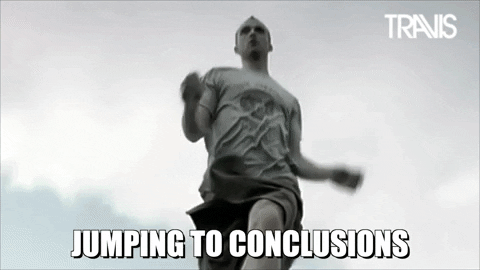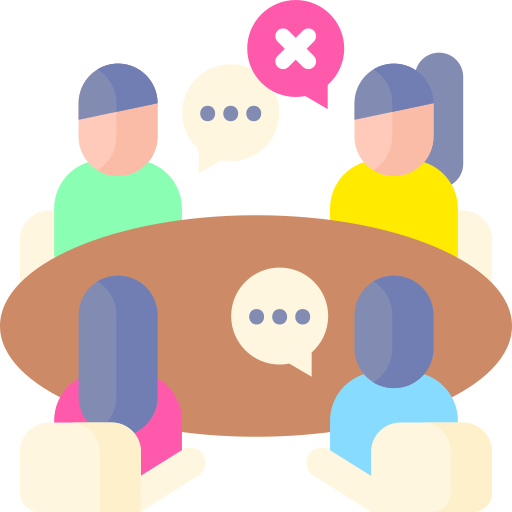"This will be difficult!"
In some cultures like the US, this can mean "Yes, we can do that!"
In others, like Japan, this can mean, "No, it's not possible."
These are examples of cultural assumptions that often creep into our daily lives.

Learning how to identify and address cultural assumptions will help prevent you from jumping to conclusions about the way other people act.
Identifying Cultural Assumptions
Cultural assumptions define what's normal or acceptable in every social situation.
To identify cultural assumptions, ask yourself:
Why do I think this?
 Cultural assumptions are often passed from generation to generation, so you probably won't have a clear answer as to why you think this way.
Cultural assumptions are often passed from generation to generation, so you probably won't have a clear answer as to why you think this way.
Do other people think the same?
 Other people, especially in multicultural societies, might not think the same or make the same assumption as you do.
Other people, especially in multicultural societies, might not think the same or make the same assumption as you do.
Consider This...
A little girl watches her mother prepare a fish for dinner.
 Her mother cuts the head and tail off the fish and then places it into a baking pan. The girl thinks it's strange so she asks her mother why she does it.
Her mother cuts the head and tail off the fish and then places it into a baking pan. The girl thinks it's strange so she asks her mother why she does it.
Her mother thinks for a while and says, "I’ve always done it that way — that’s how your grandma did it."
 The little girl visits her grandma to ask her. Grandma replies, ‘"I don’t know. My mother always did it that way."
The little girl visits her grandma to ask her. Grandma replies, ‘"I don’t know. My mother always did it that way."
 So the little girl visits her great grandma. She says, "Because my baking pan was too small to fit in the whole fish."
So the little girl visits her great grandma. She says, "Because my baking pan was too small to fit in the whole fish."

Quiz
What does this story tell us about cultural assumptions?
Did you know?
Be Aware Of Your Own Culture

Culture is an idea you might not be aware of until you’re confronted with people who have different cultural values and ways of doing things.
Because culture is drilled into all of us from earliest childhood, we don’t even think about it. It’s just the way things get done.
And since we don’t even think about our own culture, how can we be aware that other cultures can be so different?
Subscribe for more quick bites of learning delivered to your inbox.
Unsubscribe anytime. No spam. 🙂
Use The Culture Iceberg Theory
Culture is similar to an iceberg where 10% is visible but 90% is hidden.

External/Surface
 Explicitly learned
Explicitly learnedConscious
Easily changeable
Objective knowledge
Internal/Deep
 Implicitly learned
Implicitly learnedUnconscious
Difficult to change
Subjective knowledge
Cultural assumptions usually fall under the internal/deep section.
This is why it's usually difficult to even be aware that we have them. Using this theory will help you better pinpoint where cultural assumptions come from.
Add Cultural Competence In The Mix
The thing about culture is that it’s learnable. What’s more, you don’t need a handbook that details every culture. You simply need to learn what cultural behavior clues to look for.

There are 6 different cultural dimensions.
Ask yourself, which one is closer to your beliefs?
POWER DISTANCE: Should society be egalitarian, or is hierarchy needed?
COLLECTIVISM VS. INDIVIDUALISM: What's more important, individual goals or group goals?
UNCERTAINTY AVOIDANCE: Do you plan ahead of time, or go with the flow?
NURTURE VS. POWER: Is it more important to be the best at what you do, or be liked by others?
LONG TERM ORIENTATION: Should you make plans based on short-term, or long-term goals?
RESTRAINT VS. INDULGENCE: Do you have to work hard to deserve a vacation?
These questions might look like a personality test, but if we look deeper these beliefs or choices often come from our own culture.

Quiz
Juan and David decided to have coffee at 5 pm. Usually David arrives on time, whereas Juan usually arrives later. What dimension of cultural behaviour clues would this be?
Challenge Assumptions
Assume that differences exist and look for them.
Be aware of your own culture and how it affects your communication style, orientation toward time, work ethic, and general worldview.
Accept ambiguity and allow yourself to learn from the different cultural values of your colleagues.
Understand that people can adapt their cultural competence.
Take Action

Your feedback matters to us.
This Byte helped me better understand the topic.
